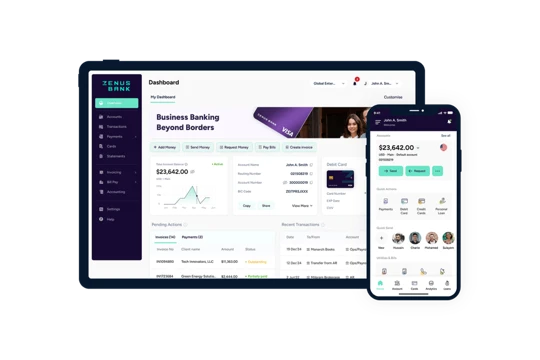What’s driving the accelerated digital transformation in banking?
John Woods, Chief Marketing Officer at Zenus
17 Nov 2022
Technology
There’s no question the rate of product innovation in financial services has accelerated in recent years, but what has driven this?
Innovation and digital transformation are now immeasurably intertwined in banking. New technology and digital practices from all sectors have enabled banks to provide more advanced, seamless, intuitive services that are more aligned with users’ personal values.
At the core of the technology advancements is the migration from monolithic banking systems to modular, interchangeable cloud infrastructure. The increased availability, lower costs and easier deployment of these systems is enabling FinTechs, neo and traditional banks to develop and deploy customisable products faster than ever before.
With the UK leading the way, Open Banking (the mandate to share customer information between institutions) is now starting to play a significant role in a global digital transformation. By enabling the real-time sharing of consumer data via APIs, digital teams can leverage existing personal information to make consumer experiences better and easier. For example, creating shorter application processes, generating personalised loan, credit or insurance offers faster and allowing the integration of accounts from different organisations into one interface selected by the user.
Meanwhile, Banking as a Service (BaaS), has started to redefine the entire financial services industry. By providing the technology and services to support financial offerings, BaaS has enabled non-financial companies to offer financial products embedded into their existing platforms. This has created new revenue streams for the new players, while giving consumers the choice to take financial products from brands they have a closer affinity with. For example, a football club could start to offer a branded bank account to its fans.
This technical push has been met with a consumer pull expedited by the recent pandemic. Lockdowns forced many users online for the first time and has reshaped working behaviours, with more people working remotely, often internationally.
As new generations are introduced to digital banking at an ever-younger age and have only known a connected world, the baseline expectations for banking services have been raised. Consumer expectations are that banking experiences are on par with the experience they receive from the next app on their home screen, be that Uber or Amazon.
Younger consumers have high demands, having only known a world where access to information is easy and answers/gratification are instantaneous. Financial services, like other industries, are looking to meet these with machine learning and AI services utilised to provide automated personalised communications; that are most importantly, delivered by a channel selected by the user, be this voice, message or text.
On a more international scale, wars, economic struggles, migrant working, and international opportunities are driving consumers to look for financial safe havens. Bank offerings can be extremely limited in both technology and services in many developing countries globally.
At Zenus Bank, we’re using technological advances to open the security, freedom, and convenience of US banking to the rest of the world. Our instantaneous cross-border account opening gives people in underserved countries access to services not previously available, while the real-time fraud and anti-money laundering checks we carry out ensure more transactions are processed without holdups or rejections.
Expect this rate of change to continue and to see more financial products and services offered by big non-financial service brands and new brands with new business models.



